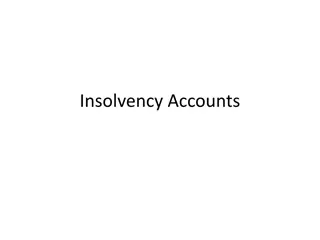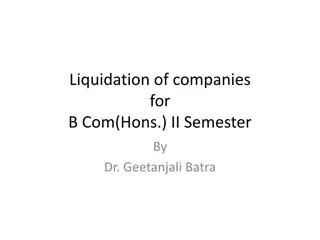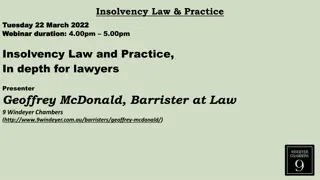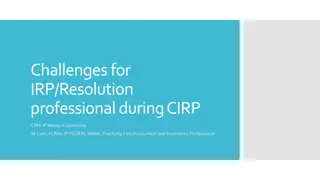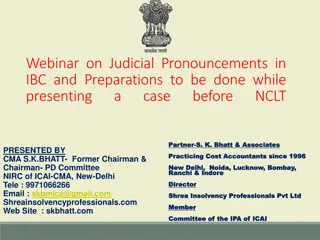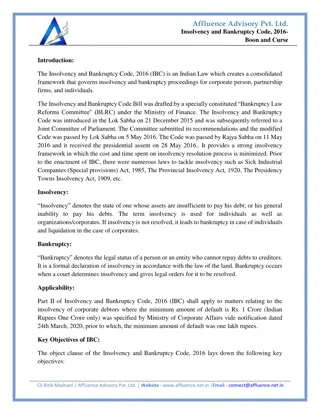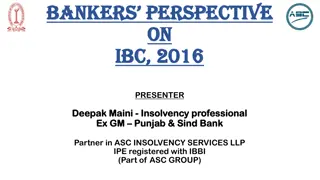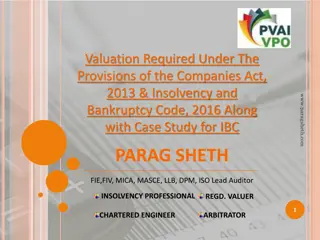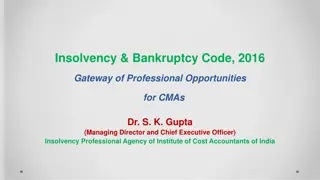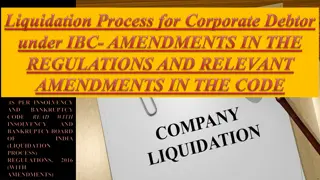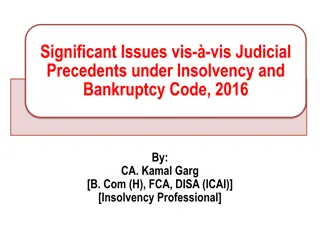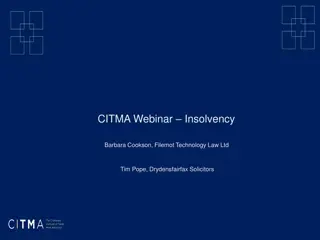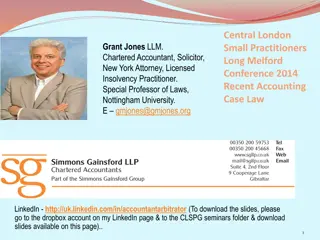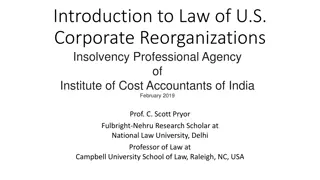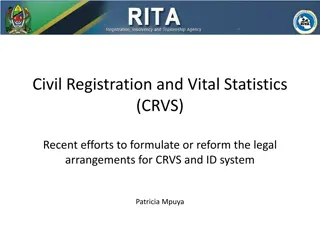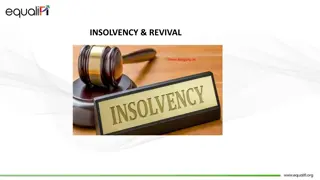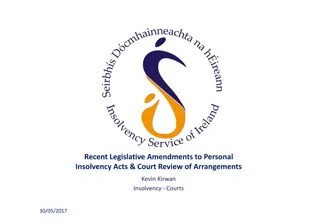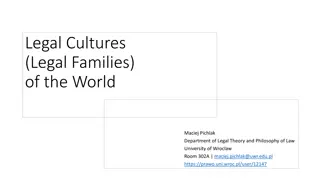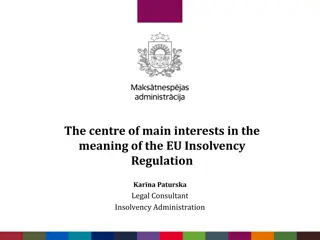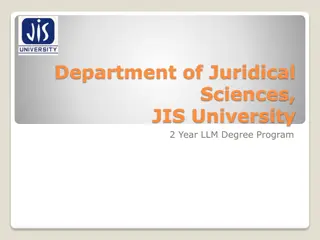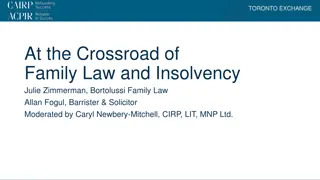Konw about our team
Know About Our Team:\nMr.Bageerathan\nMr. Bageerathan is a distinguished legal professional with a rich background spanning over 16 years in the legal field. He earned his Law degree from University Law College and further enhanced his legal acumen by obtaining Dual Masters degrees in Law (LL.M) fro
0 views • 4 slides
New Syllabus for CS Executive 2024: Understanding the Key Topics
\"The new Syllabus for CS Executive 2024 introduces key topics such as Corporate Governance, Competition Law, Insolvency, and Governance Ethics. These concepts aim to equip aspirants with a comprehensive understanding of corporate laws and practices, emphasizing the importance of ethical conduct, co
2 views • 7 slides
Understanding Insolvency Accounts and Laws in India
Insolvency accounts come into play when a debtor is unable to pay debts fully, leading to a legal process supervised by the government for debt resolution. Various scenarios constitute an act of insolvency, such as transferring property to defraud creditors or notifying them of debt payment suspensi
0 views • 38 slides
Liquidation of Companies: Procedures as per IBC 2016
The process of liquidating a company involves collecting and selling its assets to pay off debts, with remaining funds distributed to shareholders. Under the Insolvency and Bankruptcy Code (IBC) 2016, specific procedures must be followed, including initiation by either creditors or debtors within se
0 views • 16 slides
Insight into Insolvency Law & Practice: Webinar Overview
Delve into a comprehensive webinar on Insolvency Law and Practice featuring Geoffrey McDonald, a seasoned Barrister at Law. The session covers various aspects including Insolvency and Taxes, Statutory Demands, Winding-up Applications, Liquidations, Insolvent Trading, and more. Discover key statistic
0 views • 58 slides
Austin's Theory of Law by Rinkey Sharma: An Overview
Austin's Theory of Law, presented by Rinkey Sharma, delves into the Imperative Theory of Law as proposed by Austin, known as the father of English jurisprudence. It explores General and Particular Jurisprudence, Austin's definition of law, and the elements of positive law, emphasizing the concepts o
0 views • 11 slides
Understanding Insolvency Accounts and Laws in Financial Accounting
Insolvency in financial accounting refers to the inability to pay debts when they fall due. This article covers the meaning of insolvency, the criteria for being declared insolvent, the Insolvency Act in India, and its applicability to individuals, firms, and Hindu Undivided Families. It distinguish
1 views • 10 slides
Cross-Border Insolvency: Challenges and Solutions at Ritz-Carlton, Grand Cayman
Explore recent developments and potential reforms in cross-border insolvency at the event held at Ritz-Carlton, Grand Cayman. The program includes discussions on restructuring, obtaining documents abroad, a case study on cross-border insolvency, and more. Learn about practical problems facing direct
1 views • 36 slides
Challenges Faced by Insolvency Resolution Professionals during Corporate Insolvency Resolution Process
Insolvency Resolution Professionals encounter various challenges during the Corporate Insolvency Resolution Process, such as the need for prompt public announcements, appointing valuers, handling difficult transactions like preferential deals and related party transactions, assessing fraudulent acti
0 views • 8 slides
Understanding Gas Laws: Boyle's, Charles', Gay-Lussac's, and Avogadro's Laws
Gas laws such as Boyle's Law, Charles' Law, Gay-Lussac's Law, and Avogadro's Law govern the behavior of gases under different conditions. Boyle's Law relates pressure and volume at constant temperature, Charles' Law relates volume and temperature at constant pressure, Gay-Lussac's Law relates pressu
1 views • 19 slides
Webinar on Judicial Pronouncements in IBC and NCLT Case Presentation
This webinar covers judicial pronouncements in Insolvency and Bankruptcy Code (IBC) cases and essential preparations for presenting a case before the National Company Law Tribunal (NCLT). It includes insights and case discussions regarding debt assignment, related party transactions, and disputes ov
0 views • 37 slides
Insolvency and Bankruptcy Code, 2016- Boon and Curse
The Insolvency and Bankruptcy Code (IBC) 2016 provides a unified framework for resolving insolvency in India, aiming to streamline processes, reduce resolution time, and protect creditors. While it enhances financial stability and transparency, chall
0 views • 4 slides
Evolution of Trust Law in Malta
Malta, with a unique legal system integrating civil and common law concepts, has evolved its trust law over the years. The concept of trust was gradually adopted, culminating in full integration into domestic law post-2004. Recent amendments have further solidified the legal framework, bridging the
4 views • 150 slides
Challenges Faced by Banks in Adopting IBC
Banks face challenges in adopting the Insolvency and Bankruptcy Code (IBC) due to stringent provisioning norms, additional costs, and complexities in referring cases to the National Company Law Tribunal (NCLT). Secured NPA accounts older than 2 years, unsecured NPA accounts in the second year, and c
0 views • 20 slides
Overview of Valuation Requirements under Companies Act, 2013 & IBC 2016
This text provides insights into the valuation requirements stipulated by the Companies Act, 2013 and the Insolvency and Bankruptcy Code, 2016. It includes sections demanding valuation reports from registered valuers, such as for share capital issues, audit committee terms, director transactions, cr
0 views • 54 slides
Understanding the Insolvency and Bankruptcy Code of 2016 in India
The Insolvency and Bankruptcy Code of 2016 in India replaced various existing laws to streamline the process of corporate restructuring, insolvency, and liquidation. Enacted to resolve bad debts efficiently, attract investors, and strengthen the economy, the code offers benefits like quicker resolut
0 views • 31 slides
Liquidation Process and Costs under Insolvency and Bankruptcy Code
The process of passing a liquidation order under the Insolvency and Bankruptcy Code is detailed, including scenarios for passing the order and the steps involved in the liquidation process. The costs associated with liquidation, as defined under Section 5 and Regulation 2(ea), cover various expenses
0 views • 28 slides
Key Judicial Precedents on Insolvency and Bankruptcy Code, 2016
Key judicial precedents under the Insolvency and Bankruptcy Code, 2016 are discussed, including rulings on insolvency pleas, distribution of profits during Corporate Insolvency Resolution Process (CIRP), obligations of unrelated parties, the 90-day period for filing claims, and the interaction of mo
1 views • 21 slides
Understanding the Rule of Law and Legal Systems in Wales and England
The content discusses the nature of law, the Welsh and English legal systems, and the Rule of Law doctrine. It includes observations from the 2019 AS Law Unit 1 examination, emphasizing the importance of adhering to rubrics and answering questions clearly. Candidates faced challenges with timing and
0 views • 14 slides
Overview of Insolvency Procedures in Business and Individual Cases
Explore the different insolvency procedures such as bankruptcy, Individual Voluntary Arrangement (IVA), Company Voluntary Arrangement, Compulsory Liquidation, and Creditors Voluntary Liquidation. Understand the key aspects of each process, from initiating petitions to the appointment of IPs and the
0 views • 19 slides
VOLUNTARY WINDING UP
Exploring the distinctions between voluntary winding-up and compulsory winding-up in company law, focusing on the procedures involved in members' voluntary winding-up, declaration of solvency, and potential criminal sanctions for insolvent companies. The content delves into key aspects such as the a
0 views • 12 slides
Contrasting Legal Systems Around the World
Explore the diverse legal families globally, such as Civil Law (Romano-Germanic) and Common Law (Anglo-American), along with their historical backgrounds, sources of law, and dominant ideologies. Delve into the distinctions between Civil Law and Common Law, their origins, development, and practical
0 views • 17 slides
Understanding Director Disqualification and Its Impacts
Directors can become disqualified through personal insolvency or involvement in an insolvent company. Disqualification orders can be imposed by the court under specific circumstances, making the individual unfit to be involved in managing a company. The Insolvency Service plays a key role in investi
2 views • 23 slides
Understanding General Criminal Law: Principles and Relationships
General Criminal Law encompasses rules governing offenses and their penalties, exploring the definitions of offenses, relationships with social sciences, other branches of law, and auxiliary sciences. This presentation covers the importance, sources, and branches of criminal law, highlighting its in
1 views • 230 slides
Recent Accounting Case Law: Oraki v. Bramston (2014)
Appeal against Deputy Master Julia Clark's decision on the application to strike out Particulars of Claim and amend it in the case of Oraki and another v. Bramston and another in 2014. The case involves negligence allegations against chartered accountants and licensed insolvency practitioners regard
1 views • 41 slides
Understanding Combined Gas Law and Ideal Gas Law for Final Exam Preparation
Explore the concepts of Combined Gas Law, Boyle's Law, Charles's Law, Gay-Lussac's Law, and their reflection in the Ideal Gas Law. Learn how to solve problems using these laws, prepare for your final exam scheduled for Tuesday, December 12 at 12:30 in the specified room. Dive into in-class practice
1 views • 23 slides
Overview of UK Law: Statute Law, Common Law, Criminal Law, Civil Law
Statute Law is written law created through the parliamentary process, forming the basis of the legal system. Common Law, on the other hand, is unwritten law based on judicial decisions and precedents. They govern different aspects such as civil and criminal matters, each with its unique characterist
0 views • 15 slides
Understanding US Corporate Reorganizations and Insolvency Law
Explore the key players in the US bankruptcy system, including bankruptcy judges, Debtors-in-Possession, and Creditors Committee in Chapter 11. Learn about basic bankruptcy concepts such as claims and priority, and the priority scheme outlined in the Bankruptcy Code. Gain insights into the legal obl
1 views • 13 slides
The Wirecard Scandal: Misreporting, Arrests, and Insolvency
Wirecard, a once prominent German technology company, faced a scandal involving financial misreporting, resulting in arrests of top executives and eventual insolvency. Allegations of money laundering surfaced in 2016, leading to investigations and whistleblower reports. In 2020, the company's inabil
0 views • 13 slides
International Law Programs 2021: E-Castle Updates and Course Offerings
Explore the online programs offered by the International Law Programs in 2021 at the E-Castle. Discover the benefits, courses available, program dates, instructor insights, and more. From International Business Law to Public International Law, gain valuable knowledge and networking opportunities in
0 views • 21 slides
Reform Efforts in Civil Registration and Vital Statistics System in Tanzania
The Registration Insolvency and Trusteeship Agency (RITA) in Tanzania is responsible for vital event registration, insolvency services, and trusteeship services. The history of birth registration in Tanzania dates back to the colonial era, with separate systems for Mainland Tanzania and Zanzibar. La
0 views • 9 slides
Understanding the Indian Bankruptcy and Insolvency Code (IBC) of 2016
The Indian Bankruptcy and Insolvency Code (IBC) of 2016 was introduced to streamline the resolution process for companies and individuals, aiming to improve recovery rates and ranking in insolvency matters. It consolidated existing laws, creating a time-bound framework to handle insolvency cases eff
0 views • 19 slides
The Continuing Relevance of English Law to Irish Corporate Law Reform
English Law remains relevant in Irish corporate law reform, impacting areas like takeover regulation, deferred prosecution agreements, schemes of arrangement, and the comply or explain approach. The influence of English law is seen where there is no EU law dimension or when EU legislation allows mem
0 views • 10 slides
Classification of Law: Understanding Different Types and Functions
Exploring the classification of law is essential for understanding the diverse nature of legal systems. This overview delves into domestic law vs. public international law, public law vs. private law, and the sub-divisions within public law, such as constitutional, administrative, and criminal law.
0 views • 19 slides
Recent Legislative Amendments to Personal Insolvency Acts & Court Review of Arrangements
The recent legislative amendments to the Personal Insolvency Acts introduced new provisions for court reviews of arrangement proposals, including changes to eligibility thresholds for Debt Relief Notices (DRNs) and increased regulation of Personal Insolvency Practitioners (PIPs). The Court Review un
0 views • 41 slides
Overview of Legal Systems and Roman Law Development
Legal systems play a crucial role in governing societies, with Roman Law, Common Law, Civil Law, and Religious Law being some of the major types worldwide. Roman Law, focusing on private law, has influenced legal traditions in various regions, especially in Europe. Contrasting Common Law and Civil L
0 views • 26 slides
Comparative Analysis of Legal Families Around the World
Explore the diverse legal cultures and families existing globally, including Civil Law, Common Law, Far East, Islamic, Hindu, and more. Learn about the historical background, methods of reasoning, institutions, sources of law, and dominant ideologies that characterize each legal family. Delve into t
0 views • 17 slides
Understanding the Centre of Main Interests in EU Insolvency Regulation
Centre of Main Interests (COMI) plays a crucial role in determining the jurisdiction for insolvency proceedings within the EU. This concept, defined by the Regulation 1346/2000, ensures that the debtor's administration of interests is ascertainable and objective, regardless of national legislation.
0 views • 9 slides
2-Year LLM Degree Program in Juridical Sciences at JIS University
Explore the 2-year LLM degree program offered by the Department of Juridical Sciences at JIS University, specializing in Corporate Law, Criminal Law, and Constitutional Law. The program covers a range of specializations such as Comparative Criminal Law, Human Rights, Corporate Law, Competition Law,
0 views • 7 slides
Understanding Family Law and Insolvency Intersection at CAIRP Exchange Toronto
Exploring the intersection of family law and insolvency, this presentation discusses common issues such as parenting matters, child and spousal support, division of property, and the definition of a spouse. It delves into the nuances of legal terminology, rights, and claims in cases involving bankru
0 views • 51 slides


